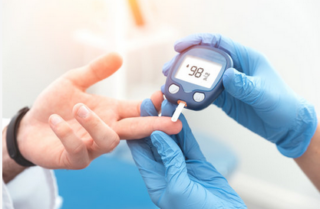Complications and Risk of COVID-19 in Diabetes Patients
 According to the American Diabetes Association, people with diabetes are more likely to have serious complications from COVID-19 and other viruses as well.
According to the American Diabetes Association, people with diabetes are more likely to have serious complications from COVID-19 and other viruses as well.
Brown Medicine Endocrinologist Dr. Jasmin Lebastchi is working on and following several studies to discover the connection between diabetes and the coronavirus. “The reason for worse prognosis in people with diabetes is not well understood but is likely to be multifactorial due the syndromic nature of diabetes,” she states. “Age, sex, ethnicity, comorbidities such as hypertension, cardiovascular disease, and obesity, probably contribute to the risk of worse outcomes. These outcomes can include sepsis, septic shock, and death.”
In the U.S., 1 out of 10 people, or 10% of the population, have diabetes. Of those who have diabetes and COVID-19, multiple studies in China and Europe show a wide incidence rate between 7-20% of patients who have an increased risk of hospitalization due to a higher risk of developing pneumonia, a hypercoagulable state (increased tendency toward blood clotting) and other inflammatory markers. The mortality rate is 30% higher in diabetics .
One theory is that COVID-19 itself might represent a worsening factor for people with diabetes through direct negative effects on β-cell function, which plays a role in insulin production. ACE2 receptor proteins, found on the surface of cells and which are involved in regulating inflammation, bind to the coronavirus and act like a doorway to let it enter and destroy the beta cells. Evidence suggests that the number of ACE2 receptors may be higher in patients with hypertension, diabetes and coronary heart disease.
“Diabetes by itself doesn’t seem to increase the risk of getting infected with COVID-19, but the mortality rate is higher, particularly in older patients with many other comorbidities,” Dr. Lebastchi continues. “Obesity plays a role in increased ICU admission and length of stay in a hospital. One theory for this is that an obese patient is in a generalized inflammatory state with often elevated blood pressure and blood sugars. Obese patients with a BMI > 35 are linked to more serious COVID complications due to restrictive abdominal fat affecting lung function, the ability to properly intubate and vent, and other respiratory dysfunction of the lungs – the primary location where the SARS-CoV-2 infection is found.”
Diabetes can present itself in more severe and life-threatening forms such as DKA (diabetic ketoacidosis, when the liver processes fat into a fuel called ketones which causes the blood to become acidic) and HHS (hyperglycemic hyperosmolar syndrome, a complication of Type 2 Diabetes involving extremely high blood sugar level). “We are seeing these complications because patients fear coming to the ER or seeking help earlier. They come to us already sick, already in a dehydrated state,” Dr. Lebastchi notes. “We are also seeing more stress-induced hyperglycemia in the hospital, which means these patients do not have a prior history of diabetes, but elevated blood sugars >180. Furthermore, some COVID treatments involve a high dose of steroids, which in itself can cause steroid-induced hyperglycemia. It’s crucial to treat hyperglycemia since we know that poor glycemic control at hospital admission and during the hospital stay worsens outcomes for patients with COVID-19.”
What can a person with diabetes do to reduce their risk of COVID complications should they test positive? “While we cannot change our age, maintaining a healthy lifestyle in terms of diet and exercise, which can help to not only improve glycemic control but also maybe lead to weight loss, will help to avoid worsening outcomes,” explains Dr. Lebastchi. “Good glycemic control begins at home. It’s helpful to keep a glucose log and be in regular contact with your physician. Our Brown Medicine TeleVisits are a great way to help prevent ER visits and to manage patient glucose levels virtually and safely.”
Dr. Lebastchi is helping to recruit diabetic patients for a vaccine trial study that is underway in Brown Medicine’s Infectious Diseases Division. In collaboration with University of Miami, Brigham and Women’s Hospital and SUNY Update, she is working to create a database of diabetic patients with a COVID-19 infection to help predict outcomes. A third study seeks to minimize the use of personal protective equipment such as gloves and masks by hospital nurses who have to do frequent glucose checks on patients. By using continuous glucose meters, nurses would not have to go in and out of a hospital room, thereby decreasing their risk of COVID-19 exposure.

